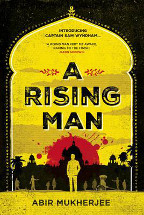A rising man by Abir Mukherjee

Random House, 2016. ISBN 9781910701898
(Age: Senior secondary-adult) Highly recommended. Crime fiction.
India. Calcutta. British Raj. When former Scotland Yard detective
Sam Wyndham is given a job by his old commander, he is happy to be
leaving post war Britain. But on his first day as Detective a high
ranking British official, MacAuley, is found dead in the Indian
suburb of Calcutta, dressed in formal attire. A note stuffed in his
mouth implies that this is a political murder by one of the Quit
India terrorists. Only just beginning his investigations, he is
astonished when summoned to his boss' office to find he already
knows of the death. Sam sees that other forces are at work, and is
torn between the secret service, the Lieutenant General and
commercial interests. When he is told to investigate the murder of a
train guard as well, his offsider, Digby, is more than dismissive,
wondering why they have been called to the murder of an Indian when
they have such an important murder of a British man to solve.
But Sam eventually links the two cases, intervening when the secret
service seems to have found the culprit, Sam trying to keep the man
alive and in his custody.
Sam is a flawed character: an opium addict after leaving a field
hospital at the end of the First Word War, he arrived home to find
his beloved wife had died during the influenza outbreak. Being
offered work in the new CID in Calcutta seems to promise a new
start, but he quickly finds his way to an opium den.
The writing reflects the times in 1920's India, where a sign on the
door to the Bengal Club states that Indians are not allowed, where
being Anglo-Indian means not being welcomed by either group, where
Sam's sergeant, Banerjee, educated in Cambridge, is treated with
little respect by those he works with, particularly Sam's second in
command, Digby.
But romance appears in the guise of MacAuley's secretary, an
Anglo-Indian girl called Annie. The mix of weather, the arrogance of
the British Raj and the fight for independence shows India at a time
of change and the shock of the Amritsar Massacre of 1919, occurring
in the midst of their investigations, reflects the turmoil the
country is in.
Mukherjee's time in Scotland has served him well. He writes nuanced
characters from Scottish backgrounds with panache, and his depiction
of Calcutta is so intense that many like me will resort to Wikipedia
to gain a visual understanding of the wonderful descriptions
presented in the book.
This book is the winner of the Harvill Secker/Daily Telegraph crime
writing competition, and is the first in a series with Captain Sam
Wyndham.
Fran Knight